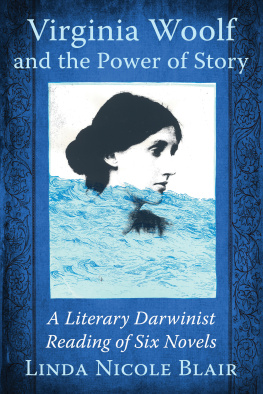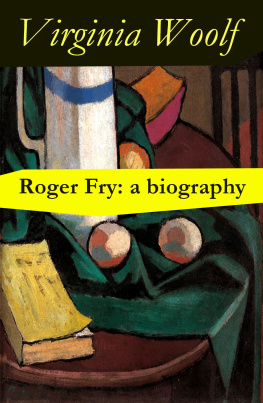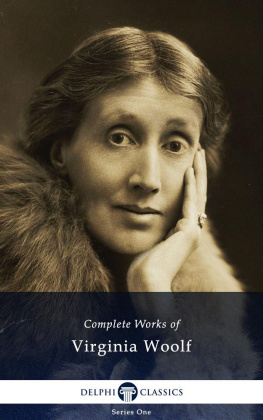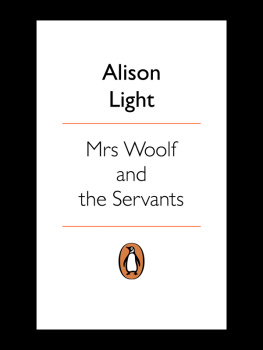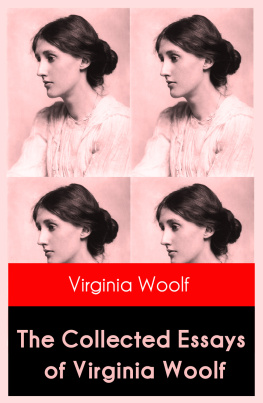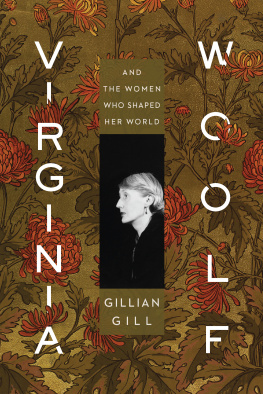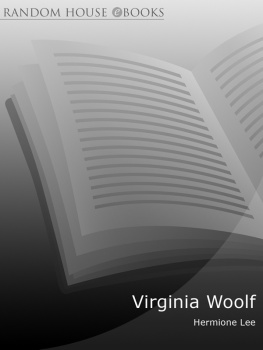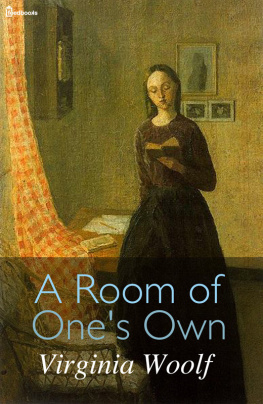
Virginia Woolf and the Power of Story
A Literary Darwinist Reading of Six Novels
Linda Nicole Blair

McFarland & Company, Inc., Publishers
Jefferson, North Carolina
LIBRARY OF CONGRESS CATALOGUING DATA ARE AVAILABLE
BRITISH LIBRARY CATALOGUING DATA ARE AVAILABLE
e-ISBN: 978-1-4766-2721-2
2017 Linda Nicole Blair. All rights reserved
No part of this book may be reproduced or transmitted in any form or by any means, electronic or mechanical, including photocopying or recording, or by any information storage and retrieval system, without permission in writing from the publisher.
Front cover art: Kathryn L. Dreier, Virginia, screen print, 10" 13", 2008
McFarland & Company, Inc., Publishers
Box 611, Jefferson, North Carolina 28640
www.mcfarlandpub.com
To my parents, who taught me to never give up,
To follow my dreams,
And to shoot for the brightest star in the sky.
Acknowledgments
This book has been a labor of love, sometimes more labor than love, but nonetheless, mostly a joy! Without the assistance of several wonderful people, it would not have happened at all. First of all, I must thank my good friend and amazing reader, Margaret Lundberg. Words cannot possibly express my gratitude to youthank you, thank you, thank you.
I am also grateful to my teaching partner from a few years back, Sam Parker: it was in his course that my interest in the nature-nurture debate began. As we taught that class, I began to see connections between the sciences and the humanities that I had not seen before. Thank you, Sam.
I must go back further in time to thank Allen Dunn, who directed my dissertation, my first lengthy piece on Woolf. I learned more about writing from him than I had ever learned in the years previous: thank you for leading me through that process and for your guidance along the way.
I would like to thank the writing groups at the University of Washington, Tacoma. Without your support, I would not have even started this project, let alone finished it. My friends, you know who you are!
I also thank the Helen Whiteley Center in Friday Harbor for two beautiful weeks of writing, and re-writing, and re-writing. That time, that spaceabsolutely essential to the completion of this book.
To all of my friends and family who have encouraged me along the way to tell this story about Story: Thank you. Last, but certainly never least, I thank my husband, Michael. You are the most patient, understanding, and supportive human on earth. And I am one lucky woman.
Prologue
What does it mean to be human? It means to love and lose, to laugh and mourn, to wake up every day into a different world, one that demands so much of us and sometimes gives back so little. It means to share our lives with each other so that we can keep waking up into this crazy world. It means that to explain our experiences, we turn to the oldest form of communication we have: Story. This book is about the evolutionary power of stories in human survival. It is also the story of Virginia Woolf, the power of story in her life, and in the lives of those who came after. In the end, the stories we tell are the stories we have lived to tell.
Part One:
Theory of Story
Introduction
Virginia Woolf and the Evolutionary Power of Story
The story, from Rumplestiltskin to War and Peace, is one of the basic tools invented by the human mind for the purpose of understanding. There have been great societies that did not use the wheel, but there have been no societies that did not tell stories.Ursula Le Guin
Fiction is like a spiders web, attached ever so lightly perhaps, but still attached to life at all four corners.Virginia Woolf, A Room of Ones Own
The Imagination is one of the highest prerogatives of man. By this faculty, he unites former images and ideas, independently of the will, and this creates brilliant and novel results.Charles Darwin, The Descent of Man
What is the power of a story? Can a story cure a broken heart, or bring together people who misunderstand each other? Is it possible for stories to help us create a new world and a better life for ourselves and our offspring? In short, can stories, that most ancient of forms, help us survive in a modern world? From a literary Darwinist perspective, it is possible to see stories not just as cultural artifacts, but as deeply integral to creating and shaping human experience. From this perspective, it is impossible to dismiss stories as dessert for the brain, as Steven Pinker has insisted. The word Story as I use it here does not refer to the literary genre known as fiction. Rather, Story as I define it includes literary fiction, incidental stories, fairytalesin other words, Story consists of a broad category that includes all forms of narrative. Story is the tool we use to cope with problems, relate to others, and create a brand new world each day of our lives.
Virginia Woolf, whose novels provide the focus of my analysis, would have agreed that inventing stories fed her heart, soul, and mind. She lived during one of the most interesting and, some would say, chaotic times in modern history. As she said, the very nature of human relations and human character in fiction changed in 1910. It seemed to her that modern life had brought with it momentous changes to society and, thus, to fiction. In Mr. Bennett and Mrs. Brown, she exhorts her contemporaries to not lose sight of the subject of their fiction: the human being. In the midst of the clutter of daily life, she argues, the reality of the human being waits to be revealed. As her fictions cut through that clutter, the characters she created have left an indelible mark on her readers. To read a Woolf novel is to have a deeply personal, and for some, a transformative experience.
In an innovative marriage of literature and science, this book brings together Virginia Woolf, one of the foremost writers of the 20th century, and Literary Darwinism, an interdisciplinary theory of the origin and adaptive role of fiction, in order to illustrate the way stories can help us survive in increasingly turbulent times.
But before I go any further, I will stop a moment and explain exactly how this book about the evolutionary power of stories came to be.
My Story: Virginia Woolf and Me
Like most children, I lived on fairytales and dreamed of becoming the heroine of my own life: I slayed my dragons, poisoned my wicked queens, and won the heart of the handsome prince every time. Fairytales taught me that nothing was impossible, and that magic lived in the most unlikely places: in the heart of an ugly frog or in the tiny face of an unsuspecting mouse. These were my first stories, and I never forgot them. The patterns of thinking that those stories engendered in my mind left an indelible impression. My love of stories eventually led me to pursue a career teaching literature at a university. Stories affect all of us in myriad ways. You may not make your living telling stories, reading them, or explaining them to students, but that doesnt mean that you, too, dont play an integral role in this world of Story.
In the past when Ive thought of powerful and transformative stories, I must admit that Virginia Woolf was not the author that immediately popped into my mind. In fact, I had not read much of her fiction until I went in pursuit of my Masters Degree in English. It was on a study abroad trip to London in 1981 that I
Next page
